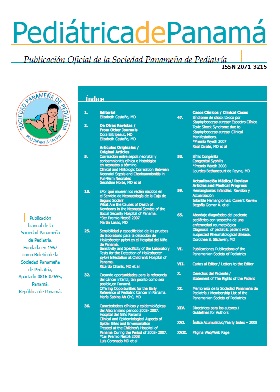Sociocultural factors associated with the intention to vaccinate against COVID -19 in children under 5 years of age in Panama
Authors
DOI:
https://doi.org/10.37980/im.journal.rspp.32465Keywords:
COVID-19, vaccination, children, distrustAbstract
Introduction: In Panama, the percentage of the adult population vaccinated against COVID-19 contrasts with that recorded for children under 5 years of age. By mid-2023, vaccination coverage in this group was 3.1% with the first dose, 0.7% with the second dose, and no data were available for the third dose. Methods: A descriptive, cross-sectional, quantitative study with convenience sampling was conducted at the Dr. José Renán Esquivel Children's Hospital (HDNJRE) in Panama. A simple statistical analysis was performed using frequency distributions. The strength of association between the variables under study and the parents' intention to vaccinate their children under 5 years of age against COVID-19 was determined using the relative inequality test (OR) with a 95% significance level and a 0.05 precision, after verifying statistical significance through the Chi-squared test (X²). Results: Willingness to vaccinate children under 5 years of age against COVID-19 was a limited 34.2%. Monthly household income, information received through social networks, prior vaccine experiences, insufficient awareness campaigns, perceived need for vaccination, distrust in vaccine safety, and fear of adverse effects were barriers to vaccination. Conclusions: The willingness to vaccinate children under 5 years of age against COVID-19 in Panama is largely influenced by perception factors that need to be addressed through health promotion strategies aimed at minimizing the impact of these determinants on vaccination coverage.
Downloads
Published
Issue
Section
License
Copyright (c) 2024 Infomedic Intl.Derechos autoriales y de reproducibilidad. La Revista Pediátrica de Panamá es un ente académico, sin fines de lucro, que forma parte de la Sociedad Panameña de Pediatría. Sus publicaciones son de tipo gratuito, para uso individual y académico. El autor, al publicar en la Revista otorga sus derechos permanente para que su contenido sea editado por la Sociedad y distribuido Infomedic International bajo la Licencia de uso de distribución. Las polítcas de distribución dependerán del tipo de envío seleccionado por el autor.






